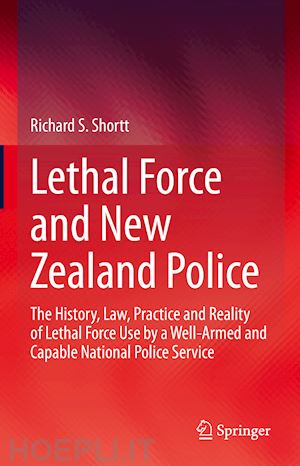
Questo prodotto usufruisce delle SPEDIZIONI GRATIS
selezionando l'opzione Corriere Veloce in fase di ordine.
Pagabile anche con Carta della cultura giovani e del merito, 18App Bonus Cultura e Carta del Docente
This book challenges the notion that the New Zealand Police are one of only four global police services that does not have routinely armed officers, using arguments and facts drawn from 2000 to 2019, a period of important change for the organisation and its relationship with firearms, particularly following the outrages of the Christchurch mosques terrorist massacres in 2019, and the 2020 shooting death of a young police constable in Aotearoa New Zealand. This book provides a brief history of the Police from its beginnings to the present day with a specific focus on its relationship with firearms, which contextualize the law that justifies use of lethal force in a country that has abolished the death penalty. It examines police policies, procedures, training and structures governing deployment and use of firearms in Aotearoa New Zealand, and the independent oversight that now applies to fatal and non-fatal shootings by Police. Using 43 publicly released oversight agency reports and data directly related to police shootings, such as who is being shot, this book investigates how the police are using lethal force, who is being affected, and what this might mean for the service with regards to the operational deployment of firearms and the potential for use of lethal force within the community into the future.
Richard Shortt completed a PhD with Charles Sturt University, in Australia, with a focus on how intelligence and law enforcement agencies work together to address transnational organised crime and terrorism. Prior to that, he worked across a range of policing environments with New Zealand Police from 1977 to 2011. During the last decade of his career, the author worked first as a national security advisor with the Department of the Prime Minister and Cabinet (DPMC), and then inside the New Zealand Security Intelligence Service (NZSIS). On returning to Police in 2008, the author joined the newly formed Organised and Financial Crime Agency of New Zealand (OFCANZ) focusing on combatting serious and organised crime until his retirement in 2011.











Il sito utilizza cookie ed altri strumenti di tracciamento che raccolgono informazioni dal dispositivo dell’utente. Oltre ai cookie tecnici ed analitici aggregati, strettamente necessari per il funzionamento di questo sito web, previo consenso dell’utente possono essere installati cookie di profilazione e marketing e cookie dei social media. Cliccando su “Accetto tutti i cookie” saranno attivate tutte le categorie di cookie. Per accettare solo deterninate categorie di cookie, cliccare invece su “Impostazioni cookie”. Chiudendo il banner o continuando a navigare saranno installati solo cookie tecnici. Per maggiori dettagli, consultare la Cookie Policy.